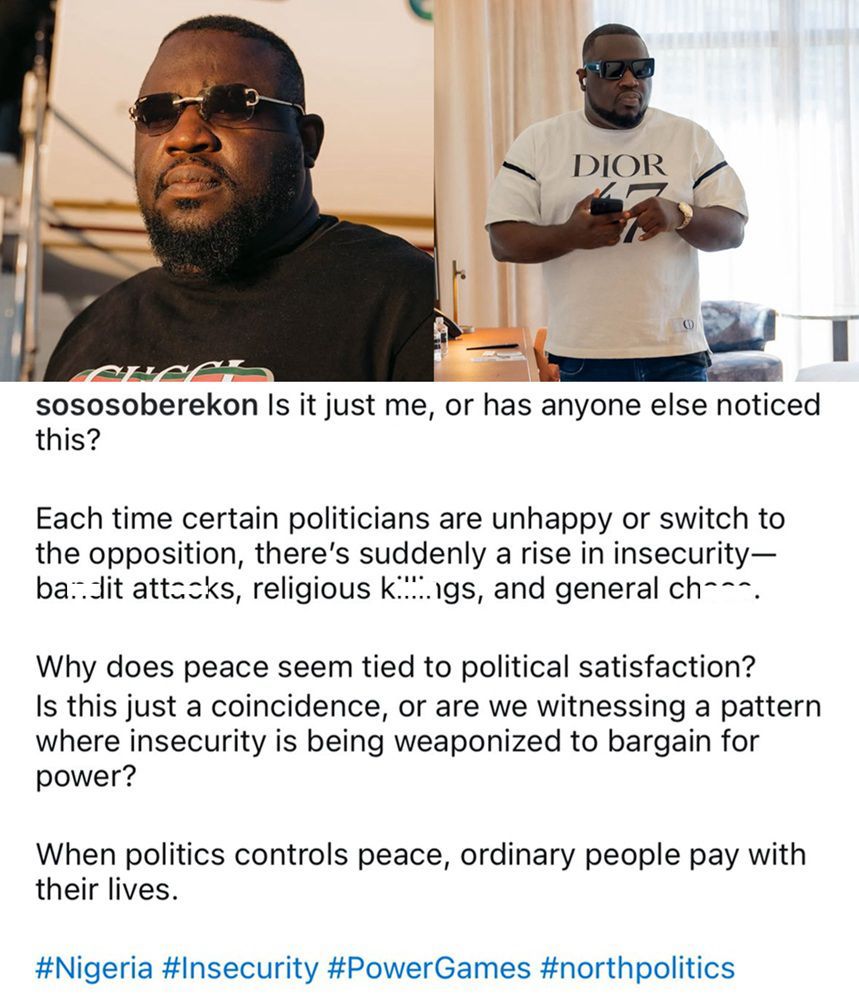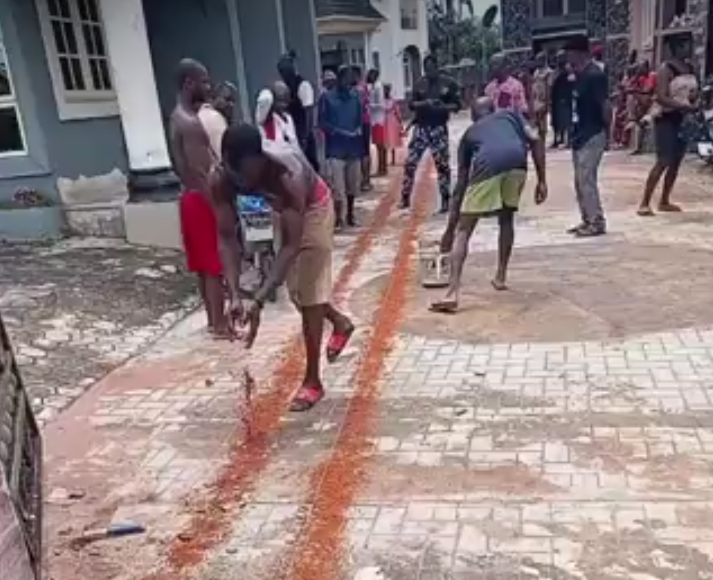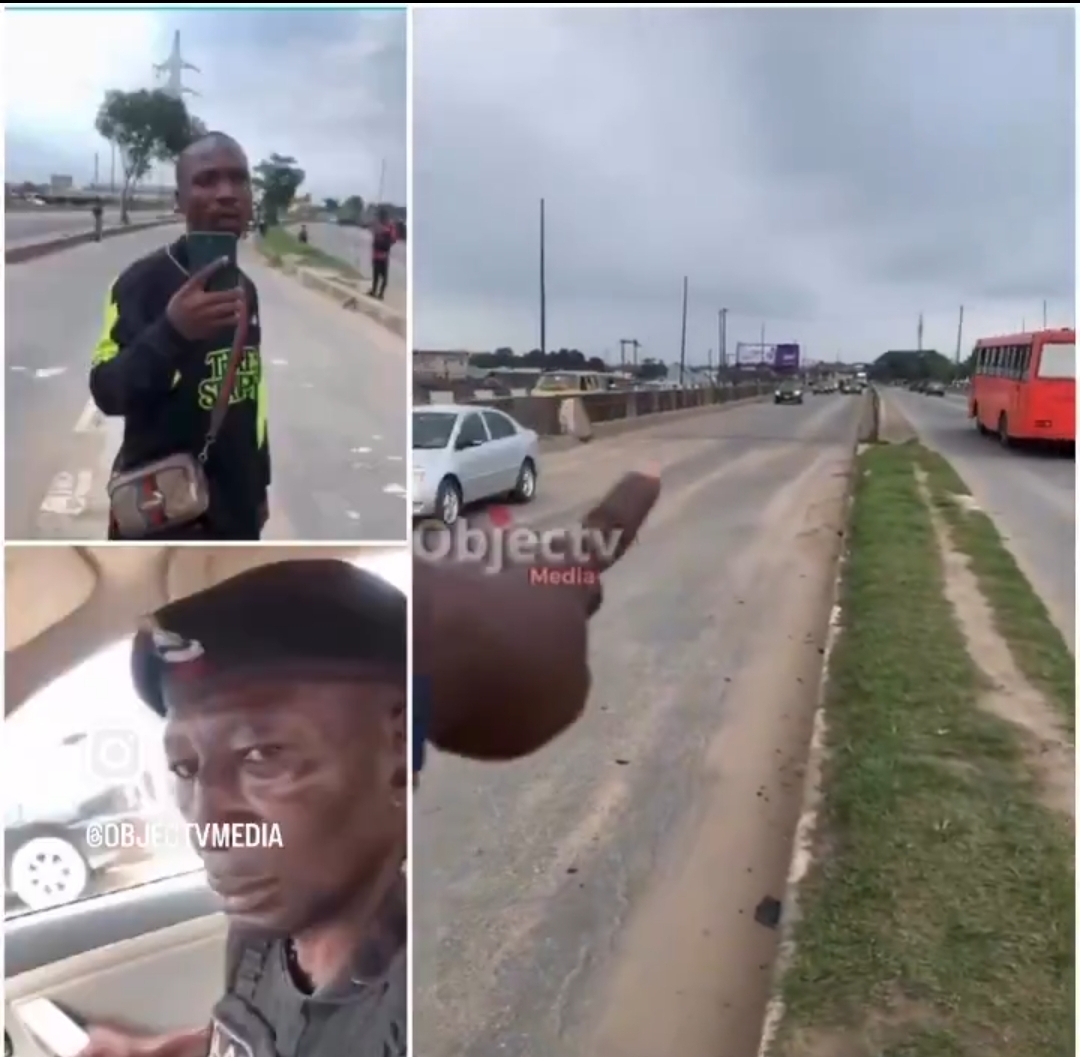
Soso Soberekon Sparks National Debate as He Links Nigeria’s Insecurity to Political Power Plays

In a country constantly grappling with issues of banditry, kidnappings, and religious violence, Nigerian music executive and entertainment mogul, Soso Soberekon, has stirred up a hornet’s nest with his recent comments about the possible link between rising insecurity and political dissatisfaction. His post, which began with a seemingly innocent question, has ignited widespread conversations across social media and mainstream platforms alike, forcing Nigerians to reflect on a chilling possibility: could peace in Nigeria be a pawn in the game of political power?
Taking to his Instagram handle, Soso Soberekon asked a question that many may have thought about but never dared to voice publicly. “Is it just me, or has anyone else noticed this?” he began. “Each time certain politicians are unhappy or switch to the opposition, there’s suddenly a rise in insecurity—bandit attacks, religious killings, and general chaos.” He went on to question whether this was all mere coincidence or if the nation is witnessing a dark pattern where violence and unrest are being weaponized as political tools to gain leverage or negotiate influence. “When politics controls peace,” he concluded gravely, “ordinary people pay with their lives.”
The comment, though brief, struck a nerve nationwide. Within hours, screenshots of the post were circulating on Twitter (X), Facebook, and WhatsApp groups. Hashtags like #Nigeria, #Insecurity, and #PowerGames began trending, with thousands of Nigerians expressing both support and concern over the implications of Soso’s statement. For many, it was the articulation of a growing fear that has long lingered beneath the surface—that Nigeria’s political elite may be benefiting from, or at the very least, turning a blind eye to, the suffering of the masses in pursuit of their own agendas.
Observers were quick to point out the recurring pattern that Soberekon described. In many parts of Northern Nigeria, for instance, spikes in banditry and insurgent activity have curiously coincided with political realignments or the fallouts of key elections. States that swing from one party to another often experience a sudden breakdown in security, prompting citizens to wonder whether these attacks are truly organic or orchestrated. The same pattern has been observed in the South East with unknown gunmen, in the Middle Belt with herdsmen conflicts, and even in some southern states during heated election seasons.
Soso Soberekon, known for his role behind the scenes in the entertainment industry, is not usually one to wade into political waters. But this time, his voice has joined that of other notable Nigerians who are daring to ask uncomfortable questions about the country's political structure and its apparent entanglement with violence. His post has resonated especially with the younger generation—many of whom are increasingly aware of the complex web of politics, governance, and social unrest that defines modern Nigeria.
Critics of the current system argue that insecurity has become more than a national crisis—it’s now a bargaining chip. According to them, when politicians fall out of favor with the ruling party, they are either denied access to security resources or accused of being complicit in the violence that follows. In some extreme cases, it is alleged that political godfathers with access to militant groups use them to create unrest, disrupt economic activity, and put pressure on federal authorities to negotiate terms.
While these claims remain unproven and largely speculative, the patterns are difficult to ignore. Soberekon’s assertion has reawakened debates about the politicization of insecurity, a topic that has been discussed in whispers but rarely in the open. His decision to speak out may have shocked some, but to others, it’s a much-needed wake-up call.
Reactions have poured in from all corners of the country. Some praised Soso for his boldness, calling him “a voice of truth in a time of silence.” Others cautioned him to be careful, warning that making such statements publicly could draw unwanted attention from those in power. Still, the overarching sentiment is one of agreement: Nigerians are tired of being casualties in a silent war they didn’t start, a war fought not with bullets alone, but with poverty, fear, and manipulation.
Political analysts have also weighed in, with some supporting the theory that insecurity spikes around election cycles and major political shake-ups. A few have called for an independent national inquiry to investigate the possible links between political defection and regional unrest, suggesting that only transparency and accountability can restore faith in the government’s commitment to protecting its citizens.
The federal government, on its part, has often denied any link between political activities and the rise in insecurity, blaming external factors such as terrorism, poverty, and cross-border criminal activities. However, the growing suspicion among the populace cannot be dismissed with simple denials. The people want answers, and they want to see a clear and unwavering commitment to peace—regardless of who holds political power.
Soso Soberekon’s remarks, though not backed by formal evidence, reflect the deep-seated distrust Nigerians feel toward the political class. His post isn’t just a critique—it’s a mirror reflecting the fears, frustrations, and unanswered questions of millions. It is a reminder that in Nigeria today, being outspoken is both an act of courage and a form of activism.
As the nation inches closer to another electoral season, the question now is whether this conversation will lead to real action or fade into the digital void like many others before it. Will policymakers and security agencies investigate these patterns? Will whistleblowers be protected? Will the lives of ordinary Nigerians finally be placed above political ambitions?
Only time will tell. But for now, Soso Soberekon has started a conversation that refuses to be silenced—a conversation that asks why peace is treated like a privilege instead of a right, and whether Nigerians must continue to bleed so that others can rise in politics. If anything, his bold statement may have opened the floodgates for more people to speak up, and that might just be the first step toward real accountability.


